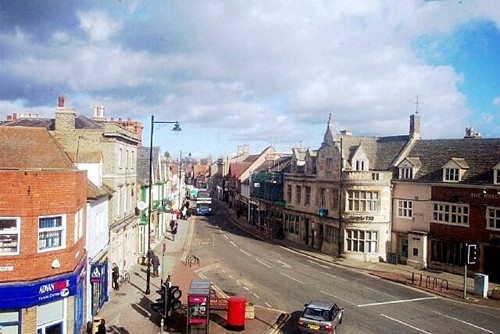
Who runs Bourne?

| THE ADMINISTRATION of our local
affairs dates back to the village meetings of early times and it is barely
a hundred years since the last of them, the vestry meetings, were replaced
by elected councils. Their formation, particularly the parish council, has
now become an integral part of our life yet can be traced back over the
centuries through the development of our villages to Saxon and Norman
times. One thousand years ago, communications were poor and central government often weak and so there was little national control. As a result, the Lord of the Manor usually controlled the villages. Eventually, he was joined by the parish priest and sometimes the schoolmaster and between them they established a kind of ruling clique because in small villages they were likely to be the only people who could read and write. By the early 17th century, vestry meetings were being held in the parish church after Sunday morning service, dealing with church affairs as well as looking after the old, the poor and the infirm, appointing church wardens, sextons and even village constables. Their authority became so complete that it was quite natural for them to be given the responsibility of levying the poor rate, the first effective local taxes. The earliest assessments were written into the account books kept by churchwardens and parish overseers. They usually gave the householder's name and the amount payable for his property. Later, printed books were used, listing the houses street by street, the value of the property, the householder's name and the amount assessed. The squire, the parson and sometimes the
schoolmaster, were still the leaders in the village in the late 19th
century but popular education was spreading and more people wanted a say
in managing local affairs and this was achieved through the 1894 Local
Government Act, championed in Parliament by the Prime Minister, William
Gladstone, and so parish councils were formed putting the administration
of our affairs at local level in the hands of elected councillors. |
|
|
BOURNE TOWN COUNCILBourne Urban District Council ceased to exist on 12th March 1974 and its duties and responsibilities were taken over by a parish council which, because of the town's historic status, was given special dispensation to become a town council with a chairman who was also the mayor. The Coat of Arms of the urban district council was acquired by the new authority and is used to this day, the motto being Vigila et Ora meaning Watch and Pray. |
|
PAST MAYORS OF BOURNE |
|
|
1974 Percy Wilson* |
1992-93 Mrs Janet
Sauter 1993-94 Peter Garner 1994-95 Mrs Lesley Patrick 1995-96 Alan Jones 1996-97 John Smith 1997-98 Mrs Shirley Cliffe 1998-99 Don Fisher 1999-00 Mrs Marjorie Clark 2000-01 John Kirkman 2001-02 Alan Jones 2002-03 Mrs Norma Woolley 2003-04 Trevor Holmes 2004-05 Mrs Petronella Moisey 2005-06 Mrs Judy Smith 2006-07 Brian Fines 2007-08 Ms Jane Kingman Pauley 2008-09 Shirley Cliffe 2009-10 Trevor Holmes 2010-11 Mrs Petronella Moisey 2011-12 Mrs Brenda Johnson |
|
*
During council changeover ** Died in office 26th January 1987 |
|
Return to Contents
![]()